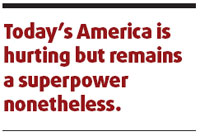US still committed to unilateralism
By Yu Sui (China Daily)
Updated: 2008-03-11 07:22
Updated: 2008-03-11 07:22
We have seen new discussions about the world structure since the beginning of this year.
French President Nicolas Sarkozy said at a reception for foreign envoys in Paris on Jan 18 the "unipolar world" that materialized after the Cold War is already over and the word "superpower", popular a few years ago, is now obsolete. The world will be in the era of "relative major powers" for the next 30 to 40 years.
These words should not be taken lightly, as they are related to views on the status of the United States and its influence in today's world, assessment of damage the US has suffered in the war in Iraq and evaluation of the role of the so-called "BRIC" nations -Brazil, Russia, India and China - and "VISTA" countries -Vietnam, Indonesia, South Africa, Turkey and Argentina.

Also on Jan 18, a respected Japanese current affairs magazine carried an article titled "the non-polar world is becoming more complicated everyday", which quoted John Chipman, director-general and chief executive of the London-based International Institute of Strategic Studies, as saying the "lack of an outstanding leader country" makes the world today a "polar-free" one: the world today is not moving toward orderly "multi-polarization", but unstable "non-polarization".
A "unipolar world" existed for a while after the Cold War; the US is a superpower no more, and the world is headed for "non-polarization". These concepts are inter-connected yet different and worth careful study.
By "world structure" I mean the strategic structure constituted by individual powers (countries) or power groups (alliances of nations) capable of influencing the whole world significantly and the structural status quo they maintain in their interaction.
The status of the US as a superpower reached its zenith after the Cold War as it single-mindedly pursued a unilateralist global strategy and there seemed to be only one pole left in the world; while in fact the world was in a relatively long transitional phase from a "bipolar" to "multi-polar" structure. The transition to a multi-polar is continuing.
Multi-polarization is a development trend, which does not mean we are already there. There is a relatively lengthy period of transition when a new one is finally established.
The basic situation during this transitional period is that the US will enjoy the "sole superpower" edge unchallenged for a rather long time within "a setup featuring one superpower and multiple major powers", but none of the major powers are strong enough to rival the US and therefore have to find solace in statements such as "superpowers" no longer exist.
If we see "the sole superpower" the US as one pole, then we probably should view the "multiple major powers" as a collective "para-pole". It is these "pole" and "para-pole" that form the multi-polar world structure, while the ideas of "unipolar world" and "non-polar world" do not reflect the reality of today's world.
The number of "multiple major powers" is growing and the new comers are developing nations or their alliances only, such as certain members of the BRIC nations and VISTA countries and perhaps the Association of Southeast Asian Nations. The ongoing accumulation and advancement of regional multi-polarization will complement and enrich the multi-polarization of the world.
Today's America is hurting but remains a superpower nonetheless.

The international situation in 2007 showed it was a year when the regional hot spots set on fire by the US sought a way out and achieved limited success amid malignant escalation.
Last year major powers tried to adjust their relations, with the US as the main cause of everything that was wrong, only to further complicate them.
Last year the US neo-conservatism was forced to make tactical adjustments with certain strategic implications after serious setbacks and under pressure to win the next presidential election.
The growing seriousness and complexity of the world situation last year was, in many ways and to a significant degree, a strong rejection of US unilateralism.
With the war in Iraq as a mark, the US has been relegated from hegemonic unilateralism to head-of-the-pack unilateralism. That means it is still committed to unilateralism but cannot do it on its own and has to rely on cooperation by other major powers, including former arch rival Russia, in a "multilateral manner".
The embarrassing situation is evident in the war on terror and even more so in the anti-proliferation campaign.
However, this situation does not mean the US will give up unilateralism in favor of multilateralism, but rather it has been forced to go along with the latter. The same is true with multi-polarization, which the US would very much not have but cannot get rid of at the moment.
Because the gap between the "sole superpower" and "multiple major powers" is narrowing by the day, the idea of the world entering the era of "relative major powers" in the next 30 to 40 years sounds original, but it is far from confirming the word "superpower" is already obsolete.
The debate over the question of world structure has been going on since day one, because the international situation has been complicated and changing all the time.
Some people say multi-polarization will "cause instability", whereas things are easier to do in a unipolar world with one voice.
American advocates of unipolarism have time and again advertised the US as a "benign hegemony" capable of delivering order to the world community that will keep it mutually beneficial. And the US government has validated this notion repeatedly through its involvement in the Balkans and Middle East wars.
The author is a researcher with the Research Center of Contemporary World
(China Daily 03/11/2008 page10)
|
|
|
|
|
|